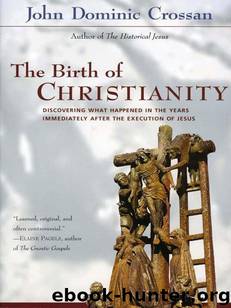The Birth of Christianity by John Dominic Crossan

Author:John Dominic Crossan [Crossan, John Dominic]
Language: eng
Format: epub
Tags: Christian Books & Bibles, Churches & Church Leadership, Church History, History, Ancient Civilizations, World, Religious, Christianity, Religion & Spirituality, Ancient
Amazon: B003JBHVWC
Publisher: HarperCollins e-books
Published: 2010-07-05T20:00:00+00:00
Jesus said, “From Adam to John the Baptist, among those born of women, no one is so much greater than John the Baptist that his eyes should not be averted [literally: be broken]. But I have said that whoever among you becomes a child will know the kingdom and will become greater than John.” (Gospel of Thomas 46)
The most significant difference from the Q Gospel version is that phrase “will know the kingdom” in Gospel of Thomas 46:2. First, the saying is quite complete without it. Next, it is not the usual verb that describes one’s relationship to the kingdom in the Gospel of Thomas. We have, for example, “enter” the kingdom in 22:2, 3, 7; 99:3; 114:3; “find” the kingdom in 27:1; 49:1; and “is far from” the kingdom in 82:1. Finally, the theme of knowing is very characteristic of the Gospel of Thomas. In other words, the saying is already being moved, but delicately and minimally, along the trajectory particular to that gospel’s esoteric and ascetical eschatology.
Conclusion.
There was a tension between John the Baptist and Jesus within the Common Sayings Tradition itself. It does not occur only at the redactional level of either the Gospel of Thomas or the Q Gospel. At that level, the former emphasizes it while the latter mutes it. It is, moreover, a tension between a Jesus who praises John profoundly in one saying, such as Into the Desert, and both praises and diminishes him profoundly in another, such as Greater Than John. John is greatest among prophets and more than a prophet. But he is below the least in the kingdom. It is not that he is least in the kingdom, because then he would clearly be in it. John the Baptist is not in the kingdom at all. That seems to indicate that there was already an anti-apocalyptic theology operative within the Common Sayings Tradition itself. But that puts it negatively. What was it positively? All of that serves as overture to the next complex, which mentions the positive alternative but still does not fill it out with much content. That still awaits the next chapter.
Download
This site does not store any files on its server. We only index and link to content provided by other sites. Please contact the content providers to delete copyright contents if any and email us, we'll remove relevant links or contents immediately.
Joan of Arc by Mary Gordon(4101)
Victory over the Darkness by Neil T. Anderson(2860)
The Gnostic Gospels by Pagels Elaine(2527)
Devil, The by Almond Philip C(2324)
The Nativity by Geza Vermes(2226)
The Psychedelic Gospels: The Secret History of Hallucinogens in Christianity by Jerry B. Brown(2149)
Going Clear: Scientology, Hollywood, and the Prison of Belief by Lawrence Wright(1978)
Going Clear by Lawrence Wright(1962)
A TIME TO KEEP SILENCE by Patrick Leigh Fermor(1898)
Barking to the Choir by Gregory Boyle(1819)
Old Testament History by John H. Sailhamer(1809)
Augustine: Conversions to Confessions by Robin Lane Fox(1769)
A History of the Franks by Gregory of Tours(1720)
A Prophet with Honor by William C. Martin(1717)
The Bible Doesn't Say That by Dr. Joel M. Hoffman(1676)
The Knights Templar by Sean Martin(1651)
by Christianity & Islam(1627)
The Source by James A. Michener(1603)
The Amish by Steven M. Nolt(1563)
